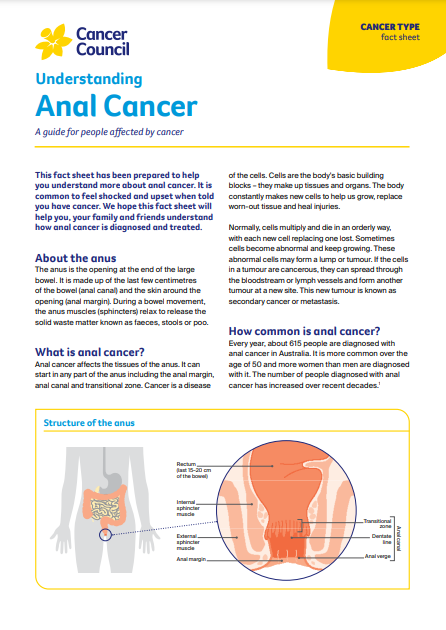- Home
- Anal cancer
- Treatment
- Chemoradiation
Chemoradiation for anal cancer
This is the most common treatment for anal cancer. It combines a course of radiation therapy with some chemotherapy sessions. It can be very effective and allow you to avoid surgery to remove your anal canal. Chemotherapy makes the cancer cells more sensitive to the radiation therapy.
For anal cancer, a typical treatment plan might involve a session of radiation therapy every weekday for several weeks, as well as chemotherapy on some days during the first and fifth weeks. This combined approach allows for lower doses of radiation therapy.
Learn more about:
- Radiation therapy
- Chemotherapy
- Side effects of chemoradiation
- Video: What are chemotherapy and radiation therapy?
Radiation therapy
Also known as radiotherapy, this treatment uses targeted radiation, such as x-ray beams, to kill or damage cancer cells. External beam radiation therapy (EBRT) is the most commonly used type of radiation for anal cancer.
EBRT focuses radiation from outside the body onto the cancer, with treatment carefully planned so as little harm as possible is done to normal body tissue around the cancer. For treatment, you lie under a machine that delivers radiation to the targeted area. It takes 10–20 minutes to set up the machine, but the treatment takes only a few minutes and is painless. You will usually be able to go home afterwards.
Chemotherapy
This is the treatment of cancer with anti-cancer (cytotoxic) drugs. It aims to kill cancer cells while doing the least possible damage to healthy cells. For anal cancer, the drugs are usually given into a vein through an intravenous (IV) drip on the first day and then in tablet form for the rest of the treatment.
Side effects of chemoradiation
Both radiation therapy and chemotherapy can have side effects. These can occur during or soon after the treatment (early side effects), or many months or years later (late side effects).
Early side effects |
Late side effects |
|
These usually settle down in the weeks after treatment. They may include:
|
These can occur several months, or even years, after treatment ends. They vary a lot from person to person, but may include:
|
For more on this, see Radiation therapy and Chemotherapy.
Effects on sexuality and fertility
Chemoradiation for anal cancer can affect your ability to have children (fertility), which may be temporary or permanent. If you may want to have children in the future, talk to your doctor about what options are available.
Learn more about how cancer and its treatment can affect sexuality and fertility, and listen to our podcast on Sex and Cancer.
→ READ MORE: Surgery for anal cancer
Videos
Podcast: Making Treatment Decisions
Listen now
More resources
Glen Guerra, Colorectal Surgeon, Peter MacCallum Cancer Centre and St Vincents Hospital Melbourne, VIC; Holly Davey, 13 11 20 Consultant, Cancer Council Queensland; Prof Peter Gibbs, Laboratory Head, Walter and Eliza Hall Institute, The University of Melbourne, Medical Oncologist, Western Hospital, VIC; A/Prof Ian Faragher, The University of Melbourne, Head of Colorectal and General Surgery Unit, Western Health, VIC; Justin Hargreaves, Medical Oncology Nurse Practitioner, Bendigo Health Cancer Centre, VIC; Prof Richard Hillman, Senior Staff Specialist, HIV and Immunology, St Vincent’s Health Network, Sydney, Conjoint Professor, St Vincent’s Clinical Campus and The Kirby Institute, NSW; A/Prof George Hruby, Radiation Oncologist, Royal North Shore Hospital, Visiting Radiation Oncologist, Genesiscare and Dubbo Base Hospital, NSW; Annie Jacobs, Consumer; Mariad O’Gorman, Clinical Psychologist, Bankstown Cancer Therapy Centre, NSW; Terry Scully, Consumer.
View the Cancer Council NSW editorial policy.
View all publications or call 13 11 20 for free printed copies.

